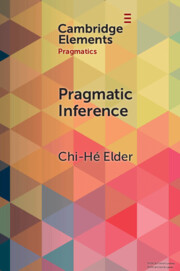Refine search
Actions for selected content:
2 results

Pragmatic Inference
- Misunderstandings, Accountability, Deniability
-
- Published online:
- 19 March 2024
- Print publication:
- 21 March 2024
-
- Element
- Export citation
Human Conditional Reasoning in Answer Set Programming
-
- Journal:
- Theory and Practice of Logic Programming / Volume 24 / Issue 1 / January 2024
- Published online by Cambridge University Press:
- 14 December 2023, pp. 157-192
-
- Article
-
- You have access
- Open access
- HTML
- Export citation











